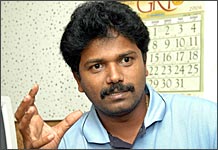|
|
| Help | |
| You are here: Rediff Home » India » Movies » Interviews |
|
 | ||
| |||||||||||||||||||||||
|
| |||||||||||||||||||||||
Last Updated: October 26, 2007 17:48 IST
From its conception to the designing of the invitation to the trailer launch, everything about Susi Ganesan's Tamil film Kandaswamy starring Vikram and Shriya is turning out to be different and big.
But what is unique about the film is the filmmaker's decision to adopt two villages as a part of their commitment to society.
In this exclusive interview, Susi Ganesan tells Shobha Warrier the reason.
I have lived in a village for more than eighteen years. So, I know what the state of the villages are like. When I thought of the story for Kandaswamy, I thought why not lead by example instead of just showing it in films.
The film talks about the growing divide between the rich and the poor due to globalisation. I know the bridge cannot be built in one night or one day but my opinion is that we all should try to bridge the gap.
That was how the idea of adopting a village and bridging the gap came about and why the Kandaswamy team decided to adopt two villages -- Angampatti and Gandhi Nagar (near Usilampetti).
We decided on these two villages after visiting many in Tamil Nadu. No, we were not hunting for location; our film is city based. We wanted to find out which village needs immediate help. My priority also was to locate those villages where there was unity among the people and no tension.
I met the people of these two villages and asked them what they wanted. They spoke of some basic requirements like the collapsed walls of the school and the balavadi buildings, the dilapidated roads, etc. We immediately attended to all those problems.
What we did was give the money directly to the people. They will do all the work that is necessary for them. It is not for us to decide what they want; they are the best judges of how their village should be.
We also have constituted a committee of seven to eight women in both the villages where they take care of everything including the finances. We felt women would do a better job of it because women are very aware and more focussed these days.
After we announced this idea at a public function, many people told us that they were also inspired to do something like this. Many from the industry told me, 'We have been getting money from the people but we have not given them anything back. It is high time we do something for them.'
 I felt quite happy to hear such comments.
I felt quite happy to hear such comments.
I have also urged all my friends to create awareness about this movement. Many rich people spend a lot of money on luxury and extravaganza; if a small portion of that is given to uplift the lives of rural India, our villages will change for the better. Many affluent people, connected with the film industry and elsewhere are promising us that they would also be a part of this movement, which is quite heartening. So many people known to me are joining hands with us now.
Before becoming a filmmaker, I was a journalist, and I feel it is my responsibility and duty to think of those who are left behind in our society. I am not saying all of us should adopt villages. It is not possible. We can start small like maybe adopt a family, or a child, or a street and so on. This is the message we want to convey to the people.
Adopting a village is like adopting a child. It will be an ongoing process. We have a lot of plans for our villages. What I mean is, even after we finish Kandaswamy, adoption of villages and working in the villages will continue. This commitment is a part of Kandaswamy and what the film stands for.
We can't make changes overnight. But I am happy that a small beginning has been made, and I am sure it will develop into a big movement because that is what I want to; a social movement.
All those who are associated with Kandaswamy are proud of being part of such a movement. All those who have been criticising cinema by saying films are a bad influence on society are appreciating our efforts. I am happy about it.
Making a film is a business but what we are doing is for our soul!
|
|
| © 2007 Rediff.com India Limited. All Rights Reserved. Disclaimer | Feedback |